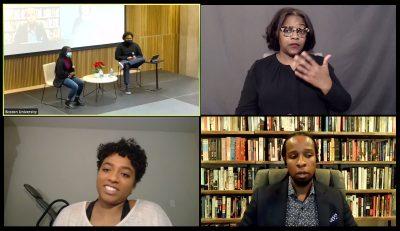Boston University’s Howard Thurman Center for Common Ground kicked off its new speaker series Wednesday with Ibram X. Kendi, the newly minted director of the school’s Center for Antiracist Research.

The event, “A Conversation with Dr. Kendi,” was moderated by Assistant Director of Thurman Center Networks Nick Bates, and joined by two student ambassadors who contributed questions and perspectives to the discussion.
Bates posed several questions to the speakers about their reflections on the presidential election and their efforts to inspire student involvement in antiracist activism.
When it comes to personal racial remarks, Kendi said, he chooses to handle such instances with an antiracist outlook — he doesn’t personalize the offense, but instead acknowledges the “pervasiveness of racism.”
“I’ve learned to try to separate what I personally consider to be offensive from feeling offended,” Kendi said during the panel. “When someone says or does something to me that is indeed racist … I’m outraged at what they did. I’m not necessarily personally feeling as if there’s something wrong with me.”
HTC Student Ambassador Archelle Thelemaque, a senior in the College of Communication, said her identity impacts the way she experiences conflict. As a Black woman, Thelemaque said, she wants to hear a multitude of other perspectives to gain a better understanding of how to approach various conflicts.
“If there’s an issue of race, or say there’s an issue where my Black womanhood is under scrutiny, especially in a place where, for example, whiteness prevails,” Thelemaque said, “I try and engage the conflict in a way that’s not detrimental to myself, because the last thing I want to do is leave a situation feeling worse about myself.”
Following the recent election, panelists sparked a discussion on voter participation in the election process.
Mikajah Hayes, a senior in the Questrom School of Business, said she was inspired to mobilize more people in her neighborhood to vote when she realized the large-scale impact African American communities can have at the voting booth.
“I think the hardest part of [getting out the vote] is recognizing that I have so many other friends and so many other family members who have this power within themselves,” Hayes said, “and how do I get them to recognize it, and then take action upon that power?”
For Hayes, personalizing her efforts by sharing her own experience with voting is how she endeavored to help others understand how important she believed the election to be.
Toward the end of the panel, Bates referenced Howard Thurman’s philosophy that “love and reconciliation” go hand in hand, and asked Kendi how activism by communities of color has impacted his understanding of Thurman’s words. Kendi responded that love is an essential motivation for furthering social movements.
“I think many of these Black and Brown women activists are driven by love,” Kendi said. “When I see their passion, when I see their organizing prowess, when I see them pushing for a different type of society, when I see them trying to lift the knee of racism off of the necks of Black and Brown people, I see them doing that as acts of love.”
HTC Director Katherine Kennedy wrote in an email that the HTC allows students to engage with Kendi, who aims to help society understand racism and antiracism through his research.
“The Thurman Center strives to continue Dr. Howard Thurman’s work of breaking barriers of divisiveness that separate people based on issues of race, class, culture, ethnicity, religion and gender identity,” Kennedy wrote in an email.
Rachel Chanderdatt, a 2019 College of Arts and Sciences alumna, serves as the outreach and communications strategist consultant for The COVID Racial Data Tracker. She said in an interview racism exists in all communities.
“While race is a social construct, racism is a real, lived experience that people face, and in order to dismantle racism, we have to understand the effects that it has on our society,” Chanderdatt said. “The first step in doing that is identifying those effects accurately.”
Chanderdatt offered her encouragement to students who aspire to confront racism within their local communities through public policy work.
“Antiracism work is hard. It takes a mental toll on you, because of a lot of the information that you gather, it’s really heartbreaking, and the severity of disparities toward communities of color is extremely large,” Chanderdatt said. “While this work is difficult, it’s extremely rewarding because, for me, I know that I’m contributing to a better future and a better society.”
















































































































